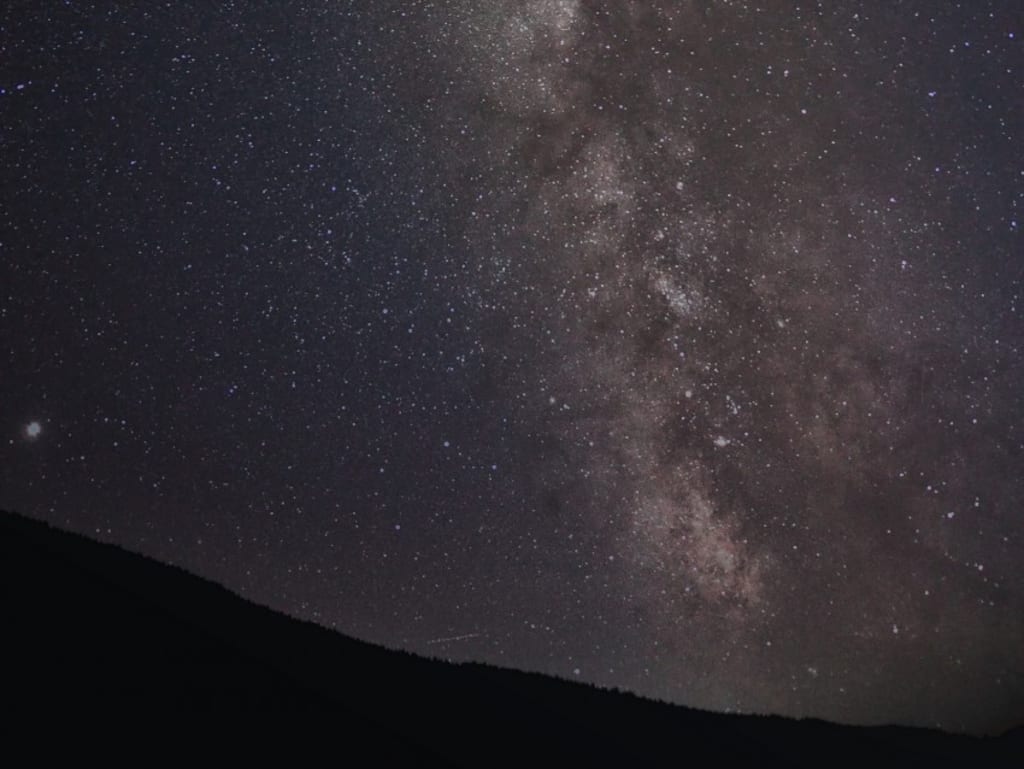The Founding of the World and the Creation of Akanía
Beauty out of Chaos

Long before recorded time nothing was that exists as it does now. The entire world of being was contained in only one thing: darkness. The darkness of the sky could not be distinguished from the darkness of the sea. All appeared as one. Nothing dwelled in the world. However, there did exist two uncreated and unchanging beings. One dwelt above the darkness of the sky, the other dwelt below the darkness of the sea. They were brothers. The one above the sky was called Cellístus and the one below the sea was known as Marrístus. They coexisted but never involved themselves in each other’s affairs.
Now it so happened that while Cellístus was gazing upon the ever present, unending blackness of the sky, over which he dwelt, he decided he no longer wanted the darkness. So he descended from his throne above the sky and came down to it. He fashioned for himself colorful paints, for he wished to draw patterns on the black canvas of the sky. He carefully dipped his finger in his colors and then touched the sky. A beautiful, brilliant fingerprint was made that shone with color and light. Cellístus loved it and thus proceeded to make millions more just like it, dotting the dark sky with the white glow of his colors. He made magnificent patterns and in this way he left his imprint in the realm of the sky.
Presently is chanced that some of these bright fingerprints received more colored paint than the rest. These then dripped some of their color and the paint fell from the sky to the dark sea below. Instead of simply descending into the waters, however, the colors mingled with it and suddenly there sprung up dry land. Islands scattered the sea as a result of the dripping colors. Marrístus became aware of these islands, for he knows everything that occurs in his realm of the sea, and he was enraged, for Cellístus had now interfered with Marrístus’ domain.
Marrístus thus sought to destroy the islands. He sent great waves upon them to break them, but they would not break. Then the sought to bring them together in a whirlpool, hoping the collision would cause their destruction. It did not. The islands simply joined themselves together into one, large landmass. Angered by his failure, Marrístus came up under the land from the sea below and smote it with his very fist. The land moved and formed a great peak, but it did not break. Then he went to the north of the land and smote with his fist there; still it would not break. Next, he went down the middle of the land, striking it over and over again. While he caused a change in the formation of the land, he could not crack it. Desperate to rid his realm of the plague of the land, Marrístus grabbed at a corner of the land and pulled with all his might, hoping to split the very earth apart. In this he was successful. Marrístus, delighted with his accomplishment, and then began to tear a hole in the earth, hoping to rip the land into pieces.
At this, Cellístus intervened. No longer could he watch while his brother attempted to destroy the product of his work, the indirect creation of his hands. He pleaded with his brother:
“I beseech you, dear Marrístus; do not destroy this created land, for from the sky it fell and I do love it.”
“Even so,” Marrístus replied. “It is no longer in the sky. It rest on the sea, which is my domain. I am free to do as I wish with it, or do you also presume to now seek dominion over the sea as well?”
“I seek no such thing. I simply ask that you let this newly made land endure.”
“Why should I do such a thing?” Marrístus demanded.
“If you permit it to continue and let this part of the sky dwell in your sea, I will permit a part of your sea to come and dwell in my sky.”
Upon consideration, Marrístus became pleased with Cellístus’ proposal and agreed. He thus caused water to rise like mist from the sea into the sky and it formed into folds of grey and white. Marrístus then asked his brother for a favor.
“Use your paints and create a sign that the two of us can see, which will serve as a reminder of the agreement we now share.”
Cellístus was pleased with his brother’s request and so put himself to the task of fashioning such a sign. He decided to make his largest and most beautiful work, which shone with more color and brilliance that any that he had made so far. He placed it in the sky and then set it into motion. Half of the time it dwelt in the sky, the other half in the sea so that each brother could see it and recall the promise they had made.
Cellístus then descended from above the sky down to the land that rested upon the sea. He used his colored paints to beautify the land and make it pleasing to look at. He then gave some of his paints to his brother so that Marrístus might use them in his own realm to bring color, beauty, and life to the darkness of the sea.
Cellístus loved all that he had made. Yet one thing still saddened him. He greatly missed his greatest and most beautiful work, the Sign of Promise, when it was in the realm of his brother. He of course loved the smaller lights, for they were his first creation and they were with him always, yet he longed to look upon his most brilliant light. Therefore, he decided to make his final painting in the sky. It was like the Sign of Promise in size but was akin to his little lights in color. He set it among them and loved it most of all the things he had made. It so happened that, like his first lights, it too dripped color. Two small drops fell from it onto the created land. The earth absorbed the color. At first, nothing happened. But then, suddenly from the ground rose life: man and woman.
Here in the land the two live in harmony. Never was their peace disturbed, for ever did Cellístus watch them by the light of his two great paintings. Marrístus too was pleased with them, for while they may have come from the sky, they rest on top of his domain. Therefore, he blessed them with running waters on all sides, making the land lush and extraordinarily beautiful. Presently the man and woman raised children who spread far and wide to all the corners of the earth.






Comments
There are no comments for this story
Be the first to respond and start the conversation.